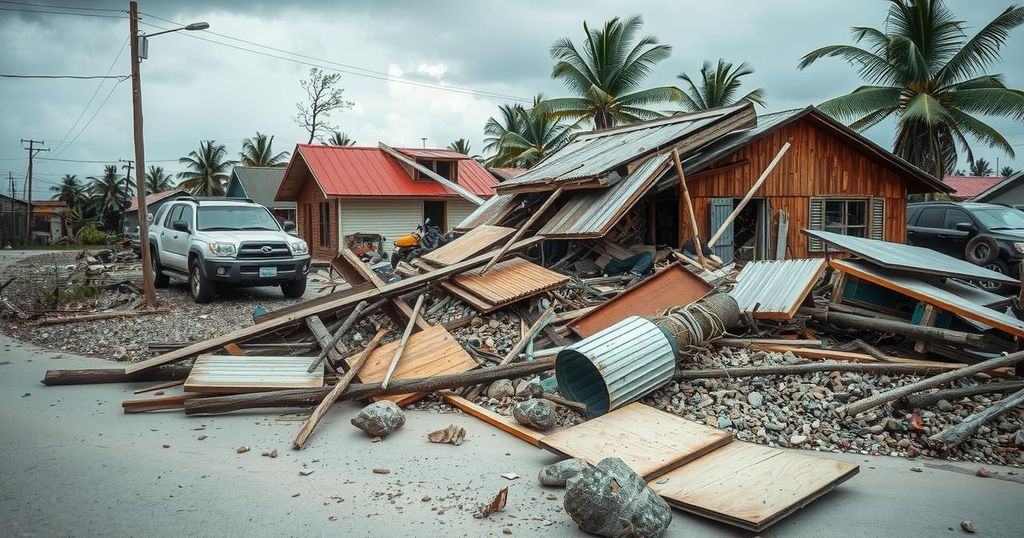World news
AFRICA, CABO DELGADO, CHI, CHIDO, EMERGENCY RESPONSE, EUROPEAN UNION, HURRICANE BERYL, LUISA MEQUE, MAPUTO, ME, MEQUE, MOZAMBICAN, MOZAMBIQUE, NAMPULA, NATIONAL INSTITUTE FOR DISASTER RISK MANAGEMENT AND REDUCTION, NATIONAL INSTITUTE OF RISK AND DISASTER MANAGEMENT, NATURAL DISASTER, NATURAL DISASTERS, NIASSA, RFI, TETE
Fatima Khan
0 Comments
Cyclone Chido Claims Lives and Devastates Mozambique
Cyclone Chido has claimed 34 lives and displaced thousands in Mozambique, causing extensive damage. It is projected to advance towards Tete and Niassa provinces, where aid is urgently needed. Despite weakening, heavy rains persist, affecting over 175,000 people. This cyclone reflects the region’s vulnerability to severe weather events, raising alarms about the well-being of children and families in its path.
Cyclone Chido has tragically resulted in the loss of at least 34 lives in Mozambique, according to the National Institute of Risk and Disaster Management. The cyclone, which made landfall earlier this week, has led to extensive destruction, displacing thousands and significantly damaging essential infrastructure such as homes and roads. The hardest-hit region has been Nampula, where initial reports indicated the first fatalities occurred.
Following these devastating impacts, Luisa Meque, the President of the National Institute for Disaster Risk Management and Reduction, urged for immediate aid, particularly as Chido progresses towards the provinces of Tete and Niassa. Although the cyclone has weakened into a severe storm, it continues to bring heavy rains and strong winds, posing ongoing hazards. Meque emphasized the necessity for community awareness and attentiveness to warnings relating to the storm.
As reported by UNICEF in Cabo Delgado, the casualty numbers are likely to increase, prompting the European Union’s humanitarian agency to call for urgent assistance. Chido’s destructive path has left approximately 319 individuals injured, while nearly 23,600 homes and 170 fishing vessels have been destroyed, affecting over 175,000 citizens.
This cyclone represents one of the most significant meteorological events the region has experienced in the past decade, having initially impacted the Indian Ocean island of Mayotte before heading towards Malawi and threatening Zimbabwe with severe weather. Save the Children highlighted the critical situation for the children and families affected, with representatives expressing deep concern over the potential loss of homes and lack of access to vital services such as clean water and healthcare.
Cyclone Chido is part of a concerning trend of increasing cyclone activity in Southern Africa, particularly impacting Mozambique, a nation frequently affected by severe weather events. The country struggles with vulnerability due to factors such as socio-economic challenges and ongoing conflicts that exacerbate the impact of natural disasters. Understanding the cyclone’s trajectory and its effects on local communities is crucial for facilitating humanitarian aid and recovery efforts. The storm is a stark reminder of the region’s susceptibility to climate-related disasters and the urgent need for robust disaster management strategies.
In summary, Cyclone Chido has resulted in significant loss of life and widespread devastation across Mozambique, with calls for urgent humanitarian assistance growing stronger. The cyclone’s path through already vulnerable regions highlights the critical need for community awareness and disaster preparedness. As recovery efforts commence, it is imperative to closely monitor the ongoing situation and provide the necessary support for those affected.
Original Source: www.rfi.fr




Post Comment